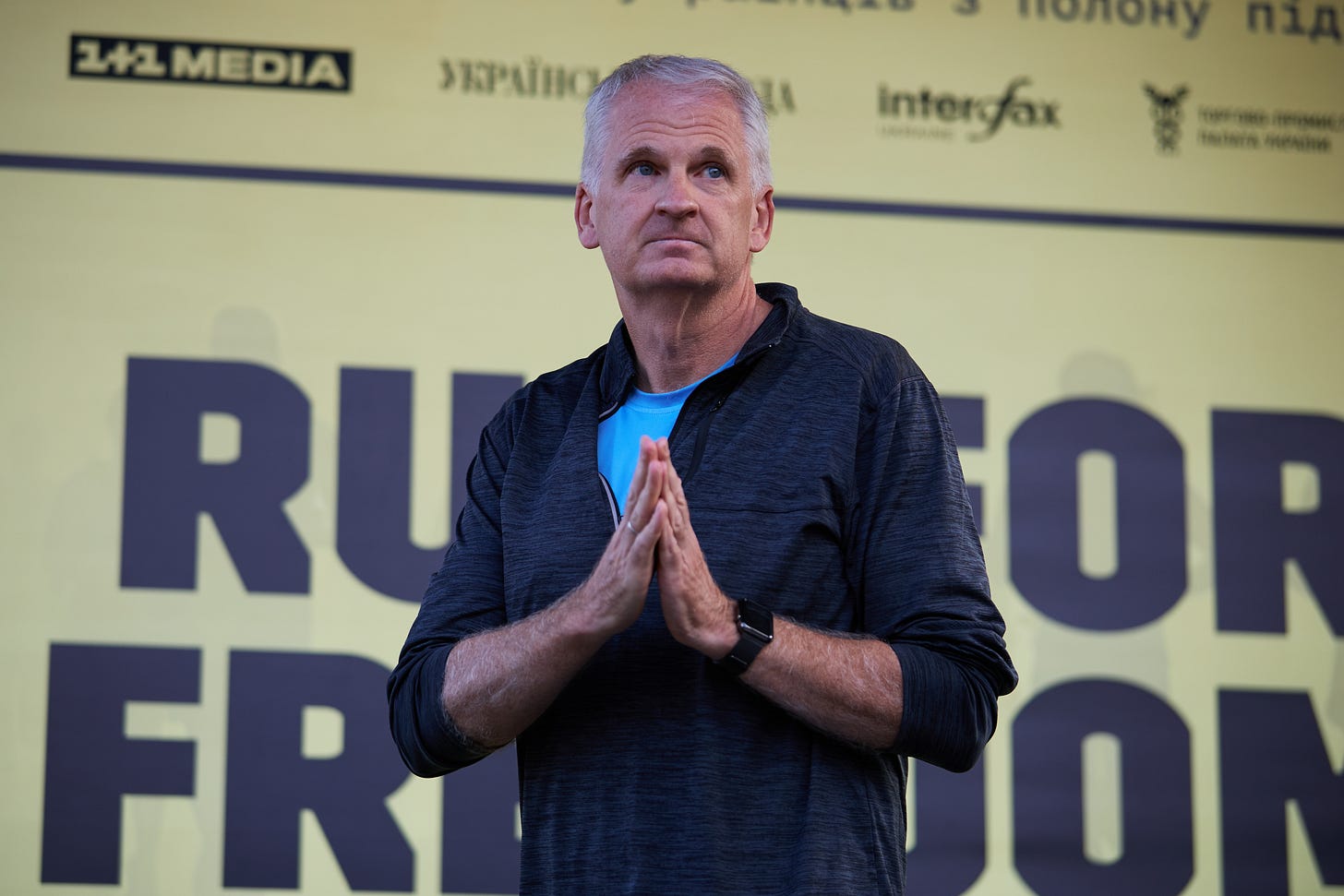Two guests on the podcast this week, et non les moindres. Anne Applebaum and Timothy Snyder. Two of the leading American experts on the history of central Europe. Two of the leading advocates for a more robust American, and Western, role in defending democracy against attack. I decided to give you my interviews with both of these formidable figures this week, because they both have new books on the problems at hand, and because all three of us happened to be briefly in Ukraine recently.
The venue for this intersection was the Yalta European Strategy conference, which started out 20 years ago as an annual gathering for pro-EU Ukrainians and has lately become an informal annual council of war. I wrote about my visit there, and specifically about Ukrainian President Volodymyr Zelensky’s opening remarks, in this post a month ago.
The YES conference reliably draws a big crowd. Most attendees have more experience in the region than I do. To say the least, that’s definitely the case for Applebaum and Snyder.
Applebaum is a staff writer for The Atlantic, following a long stint at the Washington Post and appearances in many other publications. Her book Gulag: A History won the Pulitzer Prize in 2004. Iron Curtain: The Crushing of Eastern Europe, 1944-1956, won the 2012 Cundill Prize. Red Famine: Stalin's War on Ukraine won the 2018 Lionel Gelber Prize. She cohosts a new podcast, Autocracy in America — Timothy Snyder is her guest for Episode 5. Her husband, Radoslaw Sikorski, is again Poland’s foreign minister after several years in opposition.
Applebaum’s latest book, and the basis for our conversation, is Autocracy Inc: The Dictators who Want to Rule the World. She describes a sometimes-surprising collaboration among regimes that often don’t have much in common beyond their enemy — Western democracies, especially the United States — and their methods, which split the difference between the techniques of large multinational businesses and those of organized crime. The book helps understand why North Korean soldiers are almost certainly being deployed alongside Russians in Ukraine. Applebaum thinks this new kind of threat requires a new set of responses from the U.S. and its allies, including Canada.
Snyder is the Levin Professor of History at Yale University. He’s written a stack of books about Central and Eastern Europe, most notably Bloodlands: Europe Between Hitler and Stalin, which recounted in harrowing detail what happened to the countries between two terrible industrial war-fighting regimes between 1939 and 1945: People died, probably more than 20 million of them, most of them noncombatants.
Snyder’s own latest book is On Freedom, which proposes a novel definition of freedom, one that provides for — indeed, probably requires — the interventions of an active government to maintain and defend. I asked for Snyder’s reaction to a mixed review in the New York Times by Geoffrey Wheatcroft; Snyder hadn’t read the review, and reacted off the cuff, which makes for an interesting moment. “[W}hen Snyder writes that if Ukraine’s ‘allies fail it, tyrants will be encouraged around the world, and other such wars will follow,’ some of us are old enough to feel that we’ve seen this movie before,” Wheatcroft writes in his review. “It was called the domino theory, and it was invoked to justify the Vietnam War.” Snyder was pretty quick to improvise a rebuttal to that charge.
Applebaum and Snyder, like your podcasting correspondent Wells, are hawkish on Ukraine. They believe Ukraine is the wronged party in this conflict, that it is fighting back valiantly and well, and that the resulting damage to Vladimir Putin’s plans is both overdue and has so far been achieved with remarkably little Western effort because Ukrainians are shouldering the burden. This has been a difficult month because the “victory plan” Zelensky has been selling in Western capitals is getting a mixed reaction at best. Does progress become possible after the November U.S. presidential election? That’s gonna depend pretty heavily on who wins.
Much to discuss. You can listen to this episode on Apple Podcasts and a bunch of other platforms via the “Listen On” button that you can see at the top of this post when you view it on your desktop browser. If you listen on a podcast platform, hit “Like” and “Subscribe” buttons, and leave a good review, to help spread the word.
You can read a (machine-generated) transcript of this week’s episode via the "Transcript” button at the top of this page when you view it on your desktop browser.
I am grateful to be the Max Bell Foundation Senior Fellow at McGill University, the principal patron of this podcast. Antica Productions turns these interviews into a podcast every week. Kevin Breit wrote and performed the theme music. Andy Milne plays it on piano at the end of each episode. Thanks to all of them and to you. Please tell your friends to subscribe to The Paul Wells Show on their favourite podcast app, or here on the newsletter.














Share this post